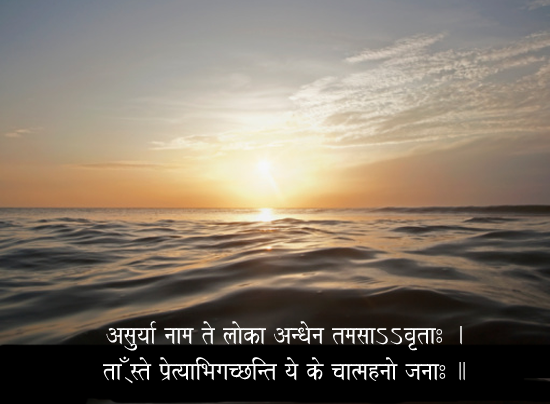Apr 16, 2024
Apr 16, 2024

Asurya nama te lokah andhena tamasa”vrtah,
Tagmste pretyabhi-gacchanti ye ke catma-hano janah (3)
Whoever be they,
the betrayers of soul
penetrate deep down into the dark worlds
of blundering gloom from here;
to go where such all defrauders of their souls reach
owing to ignorance after their death..
The killer of the soul,
whoever he may be,
must enter into the planet
known as the worlds of the faithless,
full of darkness and ignorance.
Commentary
The term used here in this shloka, “sunless world’ or asurya needs explanation. It is used as an old and traditional usage. Absence of sun is absence of light and presence of darkness is nothing but the absence of light. Light stands for knowledge and darkness for ignorance. Darkness disappears on turning towards light where as ignorance disappears if we turn towards light of the self. Even a shadow vanishes if it faces light; ignorance perishes when it turns towards self- knowledge. So in such a place of sunless existence, there rules darkness or ignorance, and the place remains devoid of real knowledge.
Ignorance means Avidya and knowledge is Vidya. Avidya has no place apart from Vidya. It stays in Vidya. Absence of Vidya is Avidya. A life wedded to Avidya or ignorance of real knowledge is simply a devilish life and such a one is condemned to blinding gloom of hellish life. Any life based on ignorance and false sense of perception cannot be a life wedded to spirituality. It is a life concentrated to physical enjoyment of body and materialistic ways of self- interest devoid of any spiritual trend. It is a life concentrated upon physical enjoyments driven by senses as approved by Virochan, the Devil. The soul remains conspicuous.
The ego-sense, I am the body, I am the mind, I am the doer arises when ever the self gets associated with the body. So the self of a person gets bound in the body as it runs after thoughts and gets entangled in pleasures to be bound with time and space. This is all the cause of misery and misfortune.
The very first line of shloka suggests that the Supreme Being is all –pervading and the universe is in fact the Eternal effulgent Infinite consciousness shinning so brightly as to dazzle the eyes of the worldly people. He is the Light in which the Self and the world shine. Actually Consciousness minus conceptualism is the Eternal Brahman, the Absolute; consciousness plus conceptualism is thought. Consciousness reflecting into consciousness shines as consciousness and exists as consciousness yet to a person, ignorant but worldly-wise and intellectualist, rational, there arises a notion that there has come into being and there exists something else other than Consciousness. To him it appears as a world appearance. It is treated as the very nature of Eternal Consciousness.
This universe so exists and remains absorbed in our very nature. The universe is neither real nor unreal, it exists in Consciousness like ornament in gold yet it does not exist independent of Consciousness. In the dazzling light of Consciousness, we fail to discriminate between sentient and insentient, inert and intelligent, and in all other essence of substances. Our intelligence identifies itself with the body. The sense of duality is awake and alert in this life of ignorance and leads us to decay and darkness of hell.
The mantra extorts us to renounce the false identification of body, mind and intellect layers and seek expansion of soul for perfection. We are essentially divine. Divinity is manifest in us. We have to realize it. Let us not become suicidal and self-destroyer of soul and march forward towards Eternity.
The soul cannot be killed; it simply means that our devilish activities lower our spirits and the soul shrinks to a lower depth of degradation and downfall. We have to guard against it. It can be possible provided we shrink our ego-sense or "I –ness". It is only possible if we devote ourselves to action. A life of action is always elevating if it involves broad pursuit of human welfare. It leads to sublime process of higher and still higher heights of renunciation. So engage yourself in action, established in spirit of Yoga and unattached to the action, thus be not bound.
Previous: Shloka 2
Next: Shloka 4
27-Feb-2011
More by : Dr. R. K. Lahri